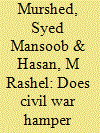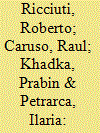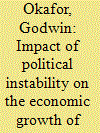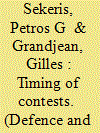| Srl | Item |
| 1 |
ID:
151709


|
|
|
|
|
| Summary/Abstract |
We examine how armed conflict effects financial development in a cross-country setting using dynamic panel data analysis in a panel of 66 developing countries for the period 1985–2010. Financial development is measured by M2 as a share of GDP, and credit allocated to private sector by banks as a share of GDP. Our findings suggest that armed conflict has a significant adverse effect on financial development. Simultaneously, the quality of governance is always highly significant and conducive to the financial development. The quality of governance is more salient in determining financial development compared to low- and medium-intensity armed conflict; however, the quality of governance cannot entirely offset the adverse impact of high-intensity armed conflict on financial development.
|
|
|
|
|
|
|
|
|
|
|
|
|
|
|
|
| 2 |
ID:
151712


|
|
|
|
|
| Summary/Abstract |
This paper investigates the effect of the deployment of United Nations Blue Helmets on economic activity in South Sudan with a special focus on agricultural production. Since UN troops are predicted to improve security, in particular, we expect a positive relationship between deployment of UN blue Helmets and cereal production. We test our hypothesis using an original data-set including all the 78 South Sudanese counties over the period 2009–2011. We control for the non-random assignment of UN troops through an Instrumental Variables approach. Our empirical results show that a 10% increase in the size of the troop allows the production of additional 600 tonnes.
|
|
|
|
|
|
|
|
|
|
|
|
|
|
|
|
| 3 |
ID:
151711


|
|
|
|
|
| Summary/Abstract |
The empirical international conflict literature has given much recent attention to interstate armed force’s impact on human well-being. While empirical research has advanced our understanding of the phenomenon considerably, we argue that one conclusion that many studies have reached is preliminary. Some recent research contends that only full-scale war, and not force short of war, has a discernable impact on human welfare or physical quality of life (PQOL). We develop theory on one type of force short of war, large-scale foreign military intervention (FMI), and its potential effects on PQOL. Using interrupted time series and panel corrected standard error methodologies, we find that from 1960 to 2005 large-scale FMI had a statistically and substantively significant impact on the PQOL of populations in 106 developing countries. The specific effect that this type of armed force has depended in large part on the regime type of the target country.
|
|
|
|
|
|
|
|
|
|
|
|
|
|
|
|
| 4 |
ID:
151710


|
|
|
|
|
| Summary/Abstract |
This study contributes to the literature on political instability and economic growth by specifically investigating the impact of political instability on the economic growth of member countries of the Economic Community of West African States (ECOWAS). West Africa is regarded as the riskiest sub-region within the African continent. To achieve this objective, this study employed panel data techniques (fixed effects and generalised method of moments) on a sample of 15 ECOWAS member countries for the period 2005–2012. The findings from the analyses showed that terrorism, poor governance, social unrest, youth unemployment, death rate and natural resource rent have negative relationships with economic growth. The findings and policy implications deduced from this study could not have been any timelier considering the recent escalation of instability in West African countries and their fragile growth prospects.
|
|
|
|
|
|
|
|
|
|
|
|
|
|
|
|
| 5 |
ID:
151708


|
|
|
|
|
| Summary/Abstract |
This paper explores the hypothesis that both the preexisting quality of democracy in a polity at the onset of conflict and the quality of democracy expected to emerge in the aftermath influence the likelihood of civil war. An empirical investigation of the hypothesis presents a challenge due to concerns of endogeneity and selection: the post-conflict level of democracy is endogenous to the pre-conflict level. Further, for a given time period, either a number of countries have not experienced civil war; or if they did, did not resolve the conflict. We overcome this selection bias by implementing a three-step extension to the Heckman procedure using an unbalanced cross-country panel of 77 countries over the period 1971–2005. Consistent with our hypothesis, we find that a standard deviation improvement in the existing level of democracy reduces the probability of civil war by approximately 9 percentage points and a corresponding improvement in expected post-conflict democratization increases the probability of conflict by approximately 48 percentage points.
|
|
|
|
|
|
|
|
|
|
|
|
|
|
|
|
| 6 |
ID:
151707


|
|
|
|
|
| Summary/Abstract |
The paper explores terrorist choice by applying two well-known theoretical frameworks: stochastic dominance and prospect theory (PT). We analyse each pair of attack methods that can be formed from the RAND-MIPT database and the Global Terrorism Database. Instances of stochastic dominance are identified. PT orderings are computed. Attention is accorded to the identification of ‘trigger points’ and the circumstances that may lead to an increased likelihood that a terrorist will select an attack method associated with a higher expected number of fatalities, i.e. a potentially more damaging attack method.
|
|
|
|
|
|
|
|
|
|
|
|
|
|
|
|
| 7 |
ID:
151706


|
|
|
|
|
| Summary/Abstract |
We develop a simple model to analyze the timing of contests. When the odds of winning a contest are exogenously given – we show that if either the players discount the future or if the total cost of contest is smaller in the future – there exist subgame perfect equilibria where both players settle, anticipating a contest in the future. With endogenous efforts, the aggregate efforts expanded in a contest are smaller if the contest occurs in the future when the relative effort productivities remain constant or diverge over time, thus creating scope for delay in contests. When the effort productivities converge over time, the total efforts may be greater under a future contest. As a consequence, players either settle over the two periods, or else they initiate a contest immediately.
|
|
|
|
|
|
|
|
|
|
|
|
|
|
|
|